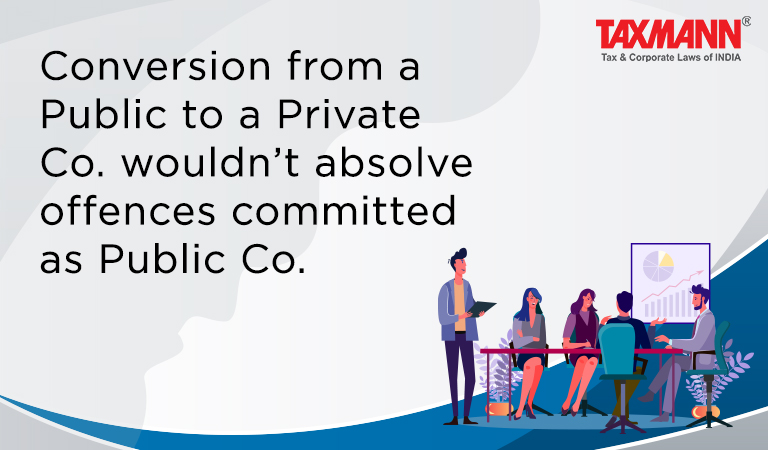Conversion from a Public to a Private Co. wouldn’t absolve offences committed as Public Co.
- Blog|News|Company Law|
- 2 Min Read
- By Taxmann
- |
- Last Updated on 9 March, 2022

Case Details: Mohan Gupta v. Union of India - [2022] 135 taxmann.com 330 (Calcutta)
Judiciary and Counsel Details
-
- Sabyasachi BhattaCharyya, J.
- Jishnu Saha, Ms. Sonal Shah, Kushagra Shah and Aniket Chaudhury for the Petitioner.
- Avinash Kankani for the Respondent.
Facts of the Case
In the instant case, the petitioners were the Joint Managing Directors of a Company, of ‘Gupta Machine Tools Private Limited’. A writ petition was filed against the disqualification of the petitioners as Directors under section 164(2)(b) alleging that the company failed to repay the deposits accepted by it or pay interest thereon on the due date or pay the interest due thereon.
The petitioner argued as follows:
(a) The petitioners argued that no notice was given to the petitioners before such disqualification under section 164(2)(b) of the Act.
(b) Furthermore, it was argued that the deposits could not have been termed as ‘unpaid’ within the purview of Section 74 of the Act. In this context, the petitioner submitted that the deposits were renewed from time to time, which is permitted under the said provision. Therefore, there does not remain any question of any dues being unpaid.
(c) It was also argued by the petitioners, the Company was converted to a private limited company with effect from May 26, 2016. As such, it was argued that on the subsequent date of disqualification, the Company could not have incurred any liability under section 74.
The next contention was that the deposits were only accepted from the Promoters/Directors/Shareholders of the Company and not from the public in general, thereby attracting the exemption under rule 2(1)(c)(viii) and (xiii) of the Companies (Acceptance and Deposits) Rules, 2014 (for short, ‘the 2014 Rules’).
High Court Held
Upon taking due note of the submission of the parties and the materials on record, the High Court observed that mere conversion of the Company into a Private Limited Company, in order to avoid previous defaults or otherwise, would not absolve the petitioners, as Directors, or the Company itself from the offences committed under section 74 of the Act, in the event such defaults were actually proved and not exempted.
The Court also held that where directors of company accepted deposits from its promoters/shareholders thereby attracting exemption under Companies (Acceptance of Deposits) Rules, 1975, more specifically rule 2(b)(ix) and (xi) of same, on failure to repay same, no liability within the contemplation of sections 164 and 167 could have been imposed on directors.
The High Court held that the disqualifications envisaged under section 164 and section 167 of the Act were not applicable to the petitioners and, as such, the decision disqualifying the petitioners’ DIN and the consequential vacation of office was illegal and bad in the eye of law.
List of Cases Referred to
-
- Allied Motors (P.) Ltd. v. CIT [1997] 91 Taxman 205/224 ITR 677 (SC) (para 6).
Disclaimer: The content/information published on the website is only for general information of the user and shall not be construed as legal advice. While the Taxmann has exercised reasonable efforts to ensure the veracity of information/content published, Taxmann shall be under no liability in any manner whatsoever for incorrect information, if any.

Taxmann Publications has a dedicated in-house Research & Editorial Team. This team consists of a team of Chartered Accountants, Company Secretaries, and Lawyers. This team works under the guidance and supervision of editor-in-chief Mr Rakesh Bhargava.
The Research and Editorial Team is responsible for developing reliable and accurate content for the readers. The team follows the six-sigma approach to achieve the benchmark of zero error in its publications and research platforms. The team ensures that the following publication guidelines are thoroughly followed while developing the content:
- The statutory material is obtained only from the authorized and reliable sources
- All the latest developments in the judicial and legislative fields are covered
- Prepare the analytical write-ups on current, controversial, and important issues to help the readers to understand the concept and its implications
- Every content published by Taxmann is complete, accurate and lucid
- All evidence-based statements are supported with proper reference to Section, Circular No., Notification No. or citations
- The golden rules of grammar, style and consistency are thoroughly followed
- Font and size that’s easy to read and remain consistent across all imprint and digital publications are applied



 CA | CS | CMA
CA | CS | CMA
